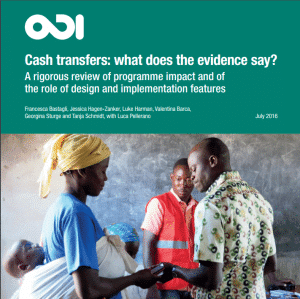
Policy highlights:
- Cash transfers are increasingly being adopted by low- and middle-income countries as a central element of their poverty reduction and social protection strategy.
- Research shows that the impact of cash transfers is greater if an element of conditionality (in terms of health and education service use) is included.
- To ensure the positive impact of cash transfers, policymakers are advised to: 1) increase the amount and time-span of cash transfers; 2) monitor and enforce conditionality; 3) adjust transfers so that they occur at critical moments in people’s lives (e.g. transfer schedules should be tied to the school-year decision cycle to ensure a positive impact on enrolment); 4) integrate health-services and nutrition into cash transfer programmes; 5) make transfers reliable to increase people’s creditworthiness and, hence, their market-opportunities; and 6) supplement cash transfers with training on gender roles, female decision-making and contraception to reduce gender inequality and empower women.






